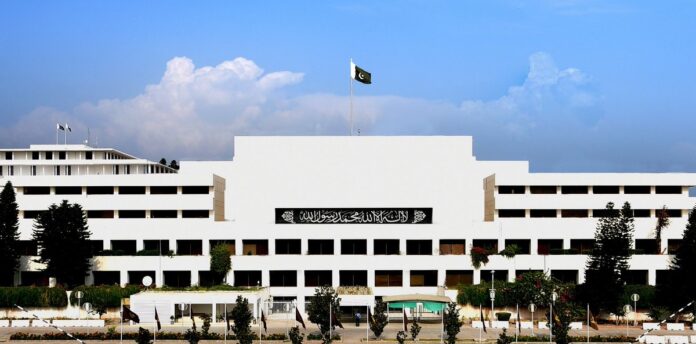ISLAMABAD: The Ministry of Finance on Tuesday proposed an amendment in the Petroleum Products (Petroleum Levy) Ordinance, 1961, to transfer the power of fixing the petroleum levy, from the parliament to the Cabinet.
The Finance Division informed the Senate Standing committee on Finance and Revenue chaired by Senator Saleem Mandviwala that the proposal is to enhance the ceiling from Rs 50 per liter to Rs 60 per liter under the Petroleum Products (Petroleum Levy) Ordinance, 1961.
After excluding Fifth Schedule, the federal government can increase levy beyond Rs 50 per litre.
The levy is the prerogative of the National Assembly and amendment would allow the federal government to raise PL on POL products, officials added.
The Minister of State for Finance said that the ministry does not intend to raise the levy to 60 rupees but seeks the necessary space and flexibility to effectively manage the petroleum levy.
The chairman committee deferred the matter with regard to giving powers to the cabinet of imposition of Rs 10 per litre PDL on petroleum products.
Senator Saadia Abbasi said that the heading of section 111 of the Income Tax Ordinance 2001 also needs to be changed. Section 111 (unexplained income and assets) should be renamed. The word “unexplained” gives a message that Pakistan is a country of money launderers.
FBR Member Policy Inland Revenue stated that the people went into litigation even after change of one word in the law and it should remain intact.
FBR Member stated that the proposed threshold is similar to the amendment made vide Income Tax Amendment Ordinance 2018, whereby this threshold was reduced to Rs 10 million at the time. Considering the Pak-US dollar back then, the threshold of Rs 10 million amounted to around $100,000. The same threshold of $100,000 has been proposed through this Bill 2023.
SECP Commissioner Abdul Rehman Warraich informed the committee that FBR cannot ask for the source of investment or income under section 111 of the Income Tax Ordinance, 2001.
FBR cannot probe tax evasion on the basis of the source of remittance under section 111 of the Ordinance 2001. Adding to that, he said that basically, section 111 taxed unexplained income except foreign remittances coming into Pakistan.
He stated that under the Finance Bill 2023, the government has enhanced the monetary limit of foreign remittance remitted from outside Pakistan from five million rupees to the rupee equivalent of $100,000. For this purpose section 111(4) is important which places a bar on asking nature and source of unexplained income/assets. However, there are more chances of money laundering after an increase of this limit, which cannot be probed by the tax officials of the FBR.
Listening to all stakeholders, the Senate Standing Committee on Finance approved the proposal with regards to enhancing the monetary limit of foreign remittance remitted from outside Pakistan from five million rupees to rupee equivalent of $100,000.
The committee approved an increase in withholding tax rate from one percent to 5 percent on payment to non-resident through debit/credit or prepaid cards (2 percent to 10 percent for non-active taxpayers). This proposal would increase the withholding tax (WHT) on international credit card transactions to 2 percent for individuals on Active Taxpayer List (ATL) and 10 percent for non-ATL citizens.
Member IR Policy FBR stated that the proposal is to discourage foreign exchange outflow on non-essential purchases online and payments made for Netflix or Google accounts.
When the Chairman committee asked the State Bank of Pakistan (SBP), the concerned official informed that around one billion dollars have been sent abroad through the payments made through 49 million credit and debit cards per year.
The committee recommended reduction in the rates of the Super Tax from 10 to 7 percent and from 8 to 6 percent.
Committee members further approved a clause in Finance Bill 2023 that allowed the federal government to collect Rs. 200,000 adjustable advance tax, from the employers of foreign workers as domestic helpers in Pakistan. The tax will be collected at the time of issuance/renewal of work permit/visa to such foreign helpers.
The committee also approved waiving off a 2 percent final withholding tax on the purchase of immovable property for non-resident individual POC/NICOP holders where the immovable property is acquired through foreign remittances remitted from abroad.
The committee accepted the inclusion of Section 113, which pertains to minimum tax on the income of certain individuals. Additionally, Section 146-D, concerning the recovery of outstanding liabilities under other laws, and Section 152, which allows for applications of exemption certificates related to payments to non-residents, were also accepted.
To encourage exports, the committee approved the proposal in Section 154, which treats sales made to Direct Exporters under the Export Facilitation Scheme, 2021, as indirect exports subject to a reduced tax rate of 1%, as opposed to the higher rate of 4.5% under Section 153(1)(a). Furthermore, Section 154A, related to tax on the export of services, was also approved.
Senator Mandviwalla emphasized the need to focus on the IT sector, highlighting that it requires incentives and special attention. Federal Minister for State, Aisha Ghaus Pasha, stated that the Finance Minister has held multiple meetings with stakeholders from the IT sector, while Senator Mandviwalla called for allowing IT service providers to maintain their accounts outside. Minister Pasha added that the IT sector has been given a 35% allowance, but the committee stressed the urgency of resolving the sector’s issues.
Sections related to “Tax on Bonus Share as Final Tax” were deferred for further clarification.





Excellent Work done and the parliament will do the things better
iuawfkxguawbrdcftnhwamiiomqkmi